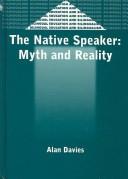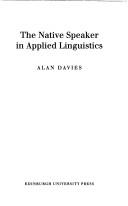| Listing 1 - 10 of 37 | << page >> |
Sort by
|
Book
ISBN: 9027212554 9789027212559 9027264643 Year: 2017 Publisher: Amsterdam John Benjamins
Abstract | Keywords | Export | Availability | Bookmark
 Loading...
Loading...Choose an application
- Reference Manager
- EndNote
- RefWorks (Direct export to RefWorks)
Why do some languages wither and die, while others prosper and spread? Around the turn of the millennium a number of archaeologists such as Colin Renfrew and Peter Bellwood made the controversial claim that many of the world’s major language families owe their dispersal to the adoption of agriculture by their early speakers. In this volume, their proposal is reassessed by linguists, investigating to what extent the economic dependence on plant cultivation really impacted language spread in various parts of the world. Special attention is paid to "tricky" language families such as Eskimo-Aleut, Quechua, Aymara, Bantu, Indo-European, Transeurasian, Turkic, Japano-Koreanic, Hmong-Mien and Trans-New Guinea, that cannot unequivocally be regarded as instances of Farming/Language Dispersal, even if subsistence played a role in their expansion.
Native language --- Mother tongue --- Vernacular language --- Language and languages
Periodical
Abstract | Keywords | Export | Availability | Bookmark
 Loading...
Loading...Choose an application
- Reference Manager
- EndNote
- RefWorks (Direct export to RefWorks)
biblical interpretation --- bible translation --- mother tongue theology --- linguistics --- biblical theology

ISBN: 1280828129 9786610828128 1853596248 9781853596247 185359623X 9781853596230 1853596221 9781853596223 9781280828126 6610828121 Year: 2003 Publisher: Clevedon Multilingual Matters Ltd
Abstract | Keywords | Export | Availability | Bookmark
 Loading...
Loading...Choose an application
- Reference Manager
- EndNote
- RefWorks (Direct export to RefWorks)
Linguists, applied linguists and language teachers all appeal to the native speaker as an important reference point. But what exactly (who exactly?) is the native speaker? This book examines the native speaker from different points of view, arguing that the native speaker is both myth and reality.
Native language. --- Applied linguistics. --- Linguistics --- Mother tongue --- Vernacular language --- Language and languages --- Sociolinguistics --- Psycholinguistics
Dissertation
Abstract | Keywords | Export | Availability | Bookmark
 Loading...
Loading...Choose an application
- Reference Manager
- EndNote
- RefWorks (Direct export to RefWorks)
Doelstelling: De doelstelling van deze scriptie is een overzicht te bieden van het beeld dat wetenschappers schetsen van de rol die het Engels tegenwoordig speelt in de wereld en op internationale conferenties. Daarbij zal de invloed die het Engels heeft in Europa uitvoeriger besproken worden en zal worden nagegaan in welke mate Europese sprekers Engels beheersen. Middelen of methode: Vanuit een literatuurstudie, aangevuld met twee pilotstudies, werd een antwoord op de onderzoeksvragen gegeven. In de eerste pilot study werden conferentieorganisatoren gecontacteerd met een vragenlijst over Europese conferenties inzake emissierechten. In de tweede pilot study werden tien conferenties geselecteerd en werd, via het internet en contact met de organisatoren, nagegaan wat de moedertaal was van de aanwezige sprekers. Resultaten: Uit de literatuurstudie blijkt dat Engels wereldwijd door een aanzienlijk aantal mensen wordt gesproken. Verder blijkt dat inwoners van verschillende Europese regio's op een andere manier Engels praten. Het empirisch onderzoek toont aan dat Engels ook het vaakst wordt aangewend als voertaal op Europese conferenties inzake emissies.
Conference. --- Emission rights. --- English. --- Euro-English. --- Interpreting. --- Kyoto protocol. --- Lingua franca. --- Mother tongue. --- Tolkstudie. --- Working language.
Book
ISBN: 3170026054 9783170026056 Year: 1977 Volume: 257 Publisher: Stuttgart Kohlhammer
Abstract | Keywords | Export | Availability | Bookmark
 Loading...
Loading...Choose an application
- Reference Manager
- EndNote
- RefWorks (Direct export to RefWorks)
Linguistics --- Communication --- Native language --- Study and teaching --- -Mother tongue --- Vernacular language --- Language and languages --- Communication, Primitive --- Mass communication --- Sociology --- Communication. --- Study and teaching. --- -Study and teaching --- -Communication, Primitive --- Mother tongue --- Language and education --- Native language - Study and teaching

ISBN: 0748602968 Year: 1991 Publisher: Edinburgh Edinburgh University Press
Abstract | Keywords | Export | Availability | Bookmark
 Loading...
Loading...Choose an application
- Reference Manager
- EndNote
- RefWorks (Direct export to RefWorks)
Linguistics --- Native language --- Language acquisition --- Sociolinguistics --- Langue maternelle --- Langage --- Sociolinguistique --- Acquisition --- Applied linguistics --- Mother tongue --- Vernacular language --- Language and languages
Book
ISBN: 9789075862942 9075862946 Year: 2007 Publisher: Rekkem Ons Erfdeel
Abstract | Keywords | Export | Availability | Bookmark
 Loading...
Loading...Choose an application
- Reference Manager
- EndNote
- RefWorks (Direct export to RefWorks)
Linguistics --- Europe --- Native language --- Mother tongue --- Vernacular language --- Language and languages --- Languages. --- Multilingualism --- Languages --- Taalkunde --- Europa --- Native language.
Book
ISBN: 1282154907 9786612154904 9027292787 9789027292780 9781282154902 9027241430 9789027241436 Year: 2006 Publisher: Amsterdam Benjamins
Abstract | Keywords | Export | Availability | Bookmark
 Loading...
Loading...Choose an application
- Reference Manager
- EndNote
- RefWorks (Direct export to RefWorks)
Heritage language (HL) researchers with a focus on East Asian languages today have recently made major advances in identifying individual and contextual factors associated with HL proficiency development in these languages. This chapter first reviews recent empirical studies that examine factors associated with or predictive of East Asian HL proficiency development such as first language background, HL use and contact, and socio-psychological variables (e.g., attitude, motivation, and identity). The chapter also reviews the literature that investigates how parents view and experience HL proficiency development. The papers collected in this volume are also discussed where relevant. This chapter concludes by suggesting directions for future research concerning East Asian HL proficiency development.
Native language. --- Immigrants --- Emigrants --- Foreign-born population --- Foreign population --- Foreigners --- Migrants --- Persons --- Aliens --- Mother tongue --- Vernacular language --- Language and languages --- Sociolinguistics --- East Asia
Dissertation
Year: 2024 Publisher: Liège Université de Liège (ULiège)
Abstract | Keywords | Export | Availability | Bookmark
 Loading...
Loading...Choose an application
- Reference Manager
- EndNote
- RefWorks (Direct export to RefWorks)
This thesis examines the dynamics of raising bilingual children in French-speaking regions, focusing on English and French language acquisition. Through semi-structured interviews with four families living in Belgium and France, the study explores their motivations, methodologies, and outcomes related to bilingual education. Key areas of investigation include the reasons behind choosing bilingual education, strategies for language exposure, challenges faced, and the educational and social outcomes observed. The literature review defines essential concepts such as Bilingual First Language Acquisition (BFLA), Family Language Policy (FLP), Code-switching, and the ‘One Person, One Language’ (OPOL) method. BFLA highlights the simultaneous acquisition of two languages from birth, while FLP and OPOL are examined for their roles in shaping bilingual development. The study also addresses the natural occurrence of code-switching as a reflection of linguistic competence. Findings show that families are driven by a desire for cognitive and academic benefits, cultural enrichment, and global opportunities. To ensure consistent language exposure, they create structured home environments, utilise bilingual education systems, and leverage media resources. Language dominance among children varies, influenced by parental preferences and societal factors. Moreover, the importance of maintaining the mother tongue alongside English and French is also emphasised for cultural identity and family cohesion. Educational outcomes reveal that bilingualism enhances cognitive abilities, academic performance, cultural awareness, and social adaptability. Parents hence view bilingualism as crucial for their children’s future success, advocating for early and sustained language exposure and supportive educational policies. Ultimately, the research underscores the benefits of bilingualism while highlighting the challenges of balancing dual language exposure. It concludes that a wellrounded approach, respecting family dynamics and societal influences, is essential for nurturing successful bilingual individuals.
Book
ISBN: 3110220946 9783110220940 9786612714900 1282714902 3110220954 9783110220957 Year: 2009 Publisher: Berlin Mouton de Gruyter
Abstract | Keywords | Export | Availability | Bookmark
 Loading...
Loading...Choose an application
- Reference Manager
- EndNote
- RefWorks (Direct export to RefWorks)
"The "native speaker" is often thought of as an ideal language user with "a complete and possibly innate competence in the language" which is perceived as being bounded and fixed to a homogeneous speech community and linked to a nation-state. Despite recent works that challenge its empirical accuracy and theoretical utility, the notion of the "native speaker" is still prevalent today. The Native Speaker Concept shifts the analytical focus from the second language acquisition processes and teaching practices to daily interactions situated in wider sociocultural and political contexts marked by increased global movements of people and multilingual situations. Using an ethnographic approach, the volume critically elucidates the political nature of (not) claiming the "native speaker" status in daily life and the ways the ideology of "native speaker" intersects and articulates, supports, subverts, or complicates various relations of dominance and regimes of standardization. The book offers cases from diverse settings, including classrooms in Japan, a coffee shop in Barcelona, secondary schools in South Africa, a backyard in Rapa Nui (Easter Island), restaurant kitchens, a high school administrator's office, a college classroom in the United States, and the Internet. It also offers a genealogy of the notion of the "native speaker" from the time of the Roman Empire. Employing linguistic, anthropological and educational theories, the volume speaks not only to the analyses of language use and language policy, planning, and teaching, but also to the investigation of wider effects of language ideology on relations of dominance, and institutional and discursive practices."--Publisher.
Multilingualism. --- Native language. --- Sociolinguistics. --- Native language --- Multilingualism --- Sociolinguistics --- Philology & Linguistics --- Languages & Literatures --- Language and languages --- Language and society --- Society and language --- Sociology of language --- Plurilingualism --- Polyglottism --- Mother tongue --- Vernacular language --- Social aspects --- Sociological aspects --- Language and culture --- Linguistics --- Sociology --- Integrational linguistics (Oxford school) --- multilingualism. --- linguistics. --- national language. --- mother tongue. --- sociology. --- Applied Linguistics. --- Language Competence. --- Language Policy.
| Listing 1 - 10 of 37 | << page >> |
Sort by
|

 Search
Search Feedback
Feedback About UniCat
About UniCat  Help
Help News
News